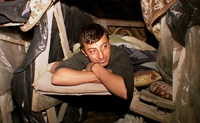From Mexico to Turkey to the Philippines to the West Bank, tens of thousands of people leave their homes every year seeking menial jobs in developed countries.
They are nearly always propelled by economic necessity, but all those individual decisions have an aggregate political effect. In his unvarnished documentary 9 Star Hotel, Israeli filmmaker Ido Haar goes beyond the headlines, the speeches and the propaganda to shine a stark light on a few illegal Palestinian laborers. With no editorializing, but with unmistakable sympathy, Haar provides a rare glimpse of Israel that will no doubt strike many Americans as oddly familiar.
9 Star Hotel airs 10 p.m., Tues., July 22 as part of PBS’ summer documentary series, “P.O.V.”
The setting is Modi’in, a planned city around 20 miles southeast of Tel Aviv and roughly the same distance west of Jerusalem. The well-known architect Moshe Safdie designed the concrete burg, which began going up in the early “˜90s.
Palestinians were employed to do the construction work, and they would commute to the site from their homes in the West Bank. But in the wake of the second intifada, Israel tightened the border and drastically reduced the number of Palestinians allowed through checkpoints.
As the film begins, on the cusp of winter, the construction of Modi’in continues apace. Palestinian laborers are still employed by Israeli contractors. However, because they don’t have work permits and can’t cross freely into Israel, dozens live in the country illegally just a few kilometers away, in the rock-strewn hills.
The film focuses on Ahmed and Muhammud and the small group of coworkers with whom they share a makeshift, rough-hewn camp. It’s an illegal settlement, essentially — an irony that will not escape some viewers.
9 Star Hotel alternates between the Palestinians’ exhausting work in Modi’in during the day and their evenings at the encampment spent making dinner over a fire, carrying on homesick conversations and keeping an eye peeled for the border police or army.
It’s a difficult, spirit-crushing life that requires exceptional sacrifices and leaves no margin for error. Trying to evade the police, Ahmed trips and injures his foot. This is catastrophic, for Ahmed is not only the sole breadwinner in his family but he’s about to get married and start a new family.
What makes 9 Star Hotel so effective is that it is shot entirely from the point of view of the Palestinians. We never see the bosses who avail themselves of their cheap labor, or the Israeli families and office workers that occupy the finished buildings. For once, the tables are turned; usually it is the Palestinian workers who are invisible.
The 50-minute film, which played a few Jewish festivals and received a New York theatrical release, is more concerned (to the degree that any Israeli documentary can be) with social reality than a political agenda. Its subjects, as the border police, whom we occasionally glimpse or overhear, recognize, are not terrorists or even activists.
They are simply ordinary people trying to get by. There are no heroes, no villains and, for the viewer, no catharsis.
Trying to get by
